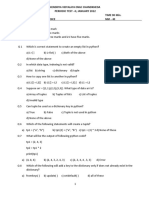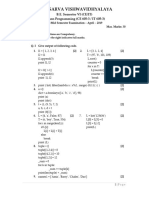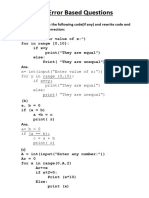0% found this document useful (0 votes)
8 views7 pagesTest Code Thinker
The document contains a series of multiple-choice questions (MCQs) related to Python programming concepts, including lists, tuples, sets, and control flow. Each question presents a code snippet followed by four answer options, testing the reader's understanding of Python's behavior and syntax. The questions cover a range of topics such as indexing, type errors, and built-in functions.
Uploaded by
Nitin OjhaCopyright
© © All Rights Reserved
We take content rights seriously. If you suspect this is your content, claim it here.
Available Formats
Download as PDF, TXT or read online on Scribd
0% found this document useful (0 votes)
8 views7 pagesTest Code Thinker
The document contains a series of multiple-choice questions (MCQs) related to Python programming concepts, including lists, tuples, sets, and control flow. Each question presents a code snippet followed by four answer options, testing the reader's understanding of Python's behavior and syntax. The questions cover a range of topics such as indexing, type errors, and built-in functions.
Uploaded by
Nitin OjhaCopyright
© © All Rights Reserved
We take content rights seriously. If you suspect this is your content, claim it here.
Available Formats
Download as PDF, TXT or read online on Scribd
/ 7































































